At the Aspen Institute Economic Opportunities Program, and for our many colleagues and partners, the ongoing and intertwined health, economic, and racial justice crises bring new urgency to our work to improve access to quality jobs, options to participate in business ownership, and the freedom to pursue economic opportunity. Below we share our monthly newsletter with highlights of recent work. As always, we welcome your feedback, thoughts, and partnership in advancing inclusive opportunity and an economy in which we all can thrive. Click here to subscribe.
Click here to view past editions of our newsletter.
News and Updates

Announcing the Greater Phoenix Workforce Leadership Academy
This month, EOP and the Center for the Future of Arizona announced the Greater Phoenix Workforce Leadership Academy. The 10-month fellowship is designed to improve local economic mobility and workforce development efforts and create innovative solutions to the challenges faced by workers and businesses. The program will strengthen the local network of nonprofit, government, academic, and business leaders through a series of retreats and workshops that enable collaboration on solutions to common challenges. Read the announcement and meet the Fellows.

Encouraging Job Quality in Small Businesses: Advising, Lending, and Procurement Approaches
As a crucial source of employment in local communities, small businesses have an important role to play in advancing economic opportunity and job quality. Yet even before the pandemic, time and resource constraints could make it challenging for small business owners to invest in workers. Around the country, innovative community development finance and economic development organizations are pursuing strategies to support small businesses to navigate the pandemic and strengthen job quality for workers. Our recent webinar, “Encouraging Job Quality in Small Businesses: Advising, Lending, and Procurement Approaches,” features leaders using these approaches to advance practices that are good for workers, businesses, and communities. Watch, listen, and learn more.
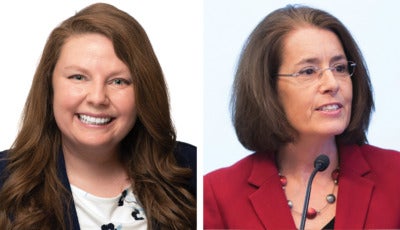
Op-ed: It’s not a labor shortage; it’s a good jobs shortage
In an op-ed for Crain’s Cleveland Business, EOP Executive Director Maureen Conway and Grace Heffernan (Member, Northeast Ohio Worker Center) argue that the prevailing narrative of a nationwide labor shortage is inaccurate and misguided. “To put it bluntly: We are not in a labor shortage. We are in a wage shortage,” they note. “We are in a good jobs shortage — jobs where workers can expect livable wages, affordable benefits, paid time off and predictable scheduling.” Instead of blaming workers for refusing to accept bad jobs or cutting essential lifelines like unemployment benefits, we must make good on our early pandemic promises and give these workers the quality jobs they deserve. Read more.
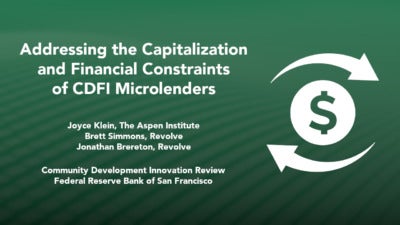
Addressing the Capitalization and Financial Constraints of CDFI Microlenders
Microlending fills a vital role in creating opportunity and equity in low-income communities, and in meeting demand for loans among entrepreneurs who have face barriers accessing credit: people of color and women. But it can be challenging for CDFIs involved in microlending to raise the capital they need to support a growing portfolio. In this article in the San Francisco Fed’s Community Development Innovation Review, “Addressing the Capitalization and Financial Constraints of CDFI Microlenders,” the Business Ownership Initiative and our co-authors from Revolve examine a novel and promising approach: create a secondary market for loans originated by community-based microlenders. Read more.

Future of Work and Future That Works for Everyone
On May 19, UpSkill America Director Jaime Fall participated in a discussion on “Future of Work and Future That Works for Everyone,” hosted by MIT. The focus of the conversation was creating career-connected educating and learning opportunities for types of all jobs. Fall participated alongside fellow panelists Todd Zipper (Wiley Education Services), Corinne Ripoche (The Adecco Group), Anna Tunkel (APCO Worldwide), and Chrystina Russell (Southern New Hampshire University). Click here to watch.

Portable Benefits Discourse Distracts from Gig Companies’ Power Play
The past year has brought new attention to workers’ rights challenges, including both the inadequacy of our safety net and the widespread misclassification of gig workers. In recent legislation meant to exempt themselves from existing classification laws, gig companies have relied on an argument for “portable benefits,” which served to distract from the issues of control at the core of classification and deceive voters into thinking that the measure would offer financial stability to gig workers. As Future of Work Initiative Director Shelly Steward describes in a new blog post, workers and the economy need real solutions that both enforce classification laws and reimagine workplace benefits. Read more.
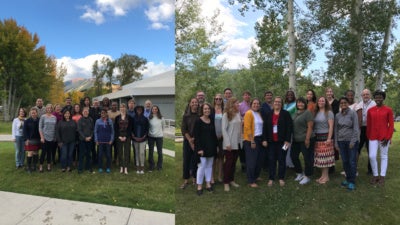
Reconvening the Job Quality Fellows
The Job Quality Fellows met virtually on three occasions in April and May, including the inaugural class of 2017-18 and the class of 2018-19. Fellows assessed progress on their proposed job quality agenda for the Biden-Harris Administration and discussed specific action items they could take in their networks and organizations. The agenda, which is centered on equity and job quality, draws on the Fellows’ original Job Quality Statement of Purpose, which cites good wages, working conditions, hours, and benefits as key aspects of a quality job. Three Fellows—Betsy Biemann of Coastal Enterprises, Inc., Jose Corona of the Eat.Play.Learn Foundation, and Caryn York of the Job Opportunities Task Force—joined us in January to discuss the agenda and ideas for centering job quality in our economic recovery. Click here to watch.
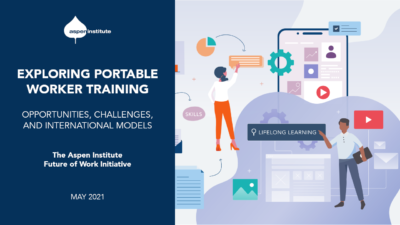
Exploring Portable Worker Training: Opportunities, Challenges, and International Models
The pandemic and resulting economic downturn have made clear the need for a more resilient and adaptable economy. Though we are beginning to recover, current trends will continue to disrupt the economy, including expanding automation, the rise of remote work arrangements, and the adoption of nonstandard work. We must equip workers for this future, including providing access to effective education and training. A new brief by Hilary Greenberg of the Future of Work Initiative, “Exploring Portable Worker Training: Opportunities, Challenges, and International Models,” explores the potential benefits and risks of one approach to do this. Portable training separates training from specific jobs, so that workers can accumulate the benefits of training as they work across multiple jobs or switch jobs frequently. Read more.

Defining Job Quality for Reemployment and Recovery
On May 6, EOP Executive Director Maureen Conway moderated a webinar for the National Governors Association’s Workforce Innovation Network, “Defining Job Quality for Reemployment and Recovery.” The conversation explored the elements of job quality and its role in state reemployment and job training services, including examples of job quality design frameworks, key elements to consider in defining a ‘good’ job for today’s evolving economy, and best practices for integrating these elements in reemployment and job training. Panelists included Job Quality Fellow Amanda Cage (National Fund for Workforce Solutions) and Brittany (Birken Federal Reserve Bank of Atlanta).
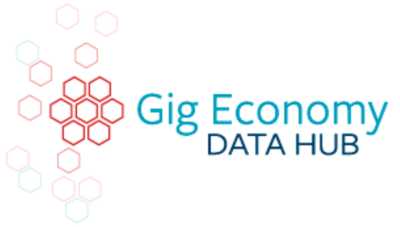
Annual Survey Shows Decline in Gig Work During Pandemic
The Federal Reserve’s annual Survey of Household Economics and Decision-making (SHED) report, released on May 17, estimated 35 percent of adults engaged in some form of gig work in 2020, a drop of four percentage points since 2019. Yoorie Chang (Research Assistant, Workforce Strategies Initiative) wrote a blog on the Future of Work Initiative’s Gig Economy Data Hub with further analysis. Read more.
Upcoming Events
EOP will continue to host virtual events and webinars this season. Join our mailing list and follow us on social media to learn when new opportunities are available.

June 3: Social Enterprise Growth Models: Employee Ownership
Converting to employee ownership offers companies an opportunity to live their values inside and out by empowering workers to become owners in success—a strategy that is proven to increase productivity, lower turnover and help purpose-driven companies separate themselves from the competition. On June 3, from 5-6 p.m. EDT, Workforce Strategies Initiative Associate Director Jenny Weissbourd will give opening remarks at “Social Enterprise Growth Models: Employee Ownership,” a discussion hosted by Owners to Owners, an initiative of Employee Ownership NYC. This discussion will feature social entrepreneurs, community leaders, and employee ownership experts discussing the perks of employee ownership and exploring if this business model is right for you. Click here to register.

June 7: Improving Job Quality & Strengthening Social Safety Net Programs for All California Workers
On June 7, from 2-3:30 p.m. EDT, EOP Executive Director Maureen Conway will moderate a webinar on “Improving Job Quality & Strengthening Social Safety Net Programs for All California Workers.” In this session—part of the Skills for California Summit 2021—participants will discuss how to ensure greater fairness and opportunity for workers earning low wages, reducing wage theft, ensuring access to rights and benefits afforded in current law, providing affordable housing for workers, and supporting worker safety net. Panelists include Peter Callstrom (San Diego Workforce Partnership), Cesar Lara (MILPA; Monterey Bay Central Labor Council), and Lola Smallwood-Cuevas (UCLA Labor Center). Learn more and register.

June 8-10: Community Economic Development Grantee Conference
EOP Executive Director Maureen Conway and Workforce Strategies Initiative Associate Director Jenny Weissbourd will participate in this year’s all-virtual Community Economic Development Grantee Conference, happening June 8-10. Their session, “Job Quality: What is it, why is it important, and what can you do about it?” includes fellow panelists Eli Allen (Civic Works) and Shawn Parker (Connie’s Chicken and Waffles), who will share practical approaches that they use to advance job quality. Parker joined us at our recent Job Quality in Practice Webinar, Can Investing in Workers Support Small Business Resiliency Through the Pandemic?, which you can view here. The conference is hosted by the Office of Community Services, within Administration of Children and Families at the US Department of Health and Human Services.

June 9: Racial Equity Strategies: How Financial Institutions Can Effectively Support Minority-Owned Small Businesses
On June 9, from 4-5:30 p.m. EDT, Business Ownership Initiative Director Joyce Klein will participate in a webinar on “Racial Equity Strategies: How Financial Institutions Can Effectively Support Minority-Owned Small Businesses,” hosted by the Federal Deposit Insurance Corporation, the Federal Reserve Bank of San Francisco, and the Office of the Comptroller of the Currency. Klein will participate alongside fellow panelists Wil Hobbs (Community Bank of the Bay), Lucas Misera (Federal Reserve Bank of Cleveland), Julius Robinson (MUFG Union Bank), and Anita Russell (Working Solutions). Presenters will share findings from the Federal Reserve Small Business Credit Survey and spotlight products and partnerships that expand access to diverse types of capital and deepen the impact of technical assistance and resources. Click here to register.

June 16: Race and Gender Wealth Equity and the Role of Employee Share Ownership
On June 16, from 1:20-2 p.m. EDT, Workforce Strategies Initiative Associate Director Jenny Weissbourd will participate in a discussion on “Race and Gender Wealth Equity and the Role of Employee Share Ownership.” This insightful and timely session will show why policymakers, funders, and investors who care about racial and gender wealth equity should support employee share ownership and the ways in which they can do so in practice. Weissbourd will speak alongside Joseph Blasi, distinguished professor and director of the Institute for the Study of Employee Ownership and Profit Sharing at Rutgers University. The discussion follows the release of our recent publication, Race and Gender Wealth Equity and the Role of Employee Share Ownership, coauthored by Weissbourd, Blasi, and colleagues at the Aspen Institute, the Democracy at Work Institute, and Rutgers University.

June 22: CSG Healthy States National Task Force
On June 22, EOP Executive Director Maureen Conway will participate in an Economic and Workforce Health Subcommittee meeting for the Council of State Governments Healthy States National Task Force. The subcommittee will explore policies that build long-term, sustainable, and equitable programs and services, such as apprenticeships, unemployment insurance, occupational licensure, and broadband access.
Join the conversation
Follow EOP on social media to join the conversation!
-Workforce Strategies Initiative @AspenWorkforce
-Business Ownership Initiative @Aspen_BOI
-UpSkill America @upskillamerica
-Future of Work Initiative @AspenFutureWork
About EOP
The Aspen Institute Economic Opportunities Program (EOP) advances strategies, policies, and ideas to help low- and moderate-income people thrive in a changing economy. We recognize that race, gender, and place intersect with and intensify the challenge of economic inequality and we address these dynamics by advancing an inclusive vision of economic justice. For over 25 years, EOP has focused on expanding individuals’ opportunities to connect to quality work, start businesses, and build economic stability that provides the freedom to pursue opportunity. For more information, visit as.pn/eop.
EOP has several initiatives, including the Business Ownership Initiative, Workforce Strategies Initiative, UpSkill America, Good Companies/Good Jobs, and the Future of Work Initiative. In addition, across these approaches EOP hosts the Economic Opportunity Fellows Network and the Opportunity in America event series.
Thank you to our many partners and funders for supporting our efforts.
Support Our Work
We are committed to making our events and publications freely available to everyone who finds them useful. But if you find value in our work and are able to support it, please consider making a tax-deductible donation. Click here to learn more.
Keep in Touch
Click here to join our mailing list. For updates every day, follow us on social media.

